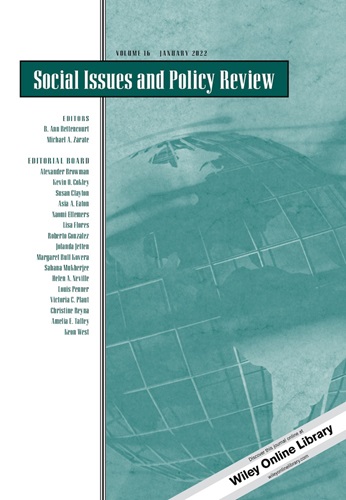采用包含体重的健康政策的循证依据
IF 5.6
1区 心理学
Q1 PSYCHOLOGY, SOCIAL
引用次数: 63
摘要
卫生政策通常强调减肥是促进健康的一个目标。这些政策基于以下假设:(1)较高的体重等于较差的健康状况,(2)长期减肥是可以广泛实现的,(3)减肥会导致身体健康的持续改善。我们对文献的回顾表明,当前以权重为中心的方法背后的这三个假设没有得到经验的支持。使这一问题更加复杂的是一些被误导的假设(4)体重耻辱(即普遍存在的社会贬低和诋毁体重较高的个体)促进减肥和(5)认识到一个人“超重”是刺激促进健康行为的必要条件。我们自始至终强调这些假设是如何在当前政策中体现出来的,并就促进健康的替代方法提出建议。最后,我们主张在卫生政策中广泛采用包含权重的方法。本文章由计算机程序翻译,如有差异,请以英文原文为准。
An Evidence‐Based Rationale for Adopting Weight‐Inclusive Health Policy
Health policies routinely emphasize weight loss as a target for health promotion. These policies rest upon the assumptions: (1) that higher body weight equals poorer health, (2) that long-term weight loss is widely achievable, and (3) that weight loss results in consistent improvements in physical health. Our review of the literature suggests that these three assumptions underlying the current weightfocused approach are not supported empirically. Complicating this further are the misguided assumptions (4) that weight stigma (i.e., pervasive social devaluation and denigration of higher weight individuals) promotes weight loss and (5) recognizing that one is “overweight” is necessary to spur health-promoting behaviors. We highlight throughout how these assumptions have manifested in current policies and offer suggestions for alternative approaches to health promotion. We conclude by advocating for the broad adoption of a weight-inclusive approach to health policy.
求助全文
通过发布文献求助,成功后即可免费获取论文全文。
去求助
来源期刊

Social Issues and Policy Review
Multiple-
CiteScore
22.20
自引率
1.10%
发文量
9
期刊介绍:
The mission of Social Issues and Policy Review (SIPR) is to provide state of the art and timely theoretical and empirical reviews of topics and programs of research that are directly relevant to understanding and addressing social issues and public policy.Papers will be accessible and relevant to a broad audience and will normally be based on a program of research. Works in SIPR will represent perspectives directly relevant to the psychological study of social issues and public policy. Contributions are expected to be review papers that present a strong scholarly foundation and consider how research and theory can inform social issues and policy or articulate the implication of social issues and public policy for theory and research.
 求助内容:
求助内容: 应助结果提醒方式:
应助结果提醒方式:


